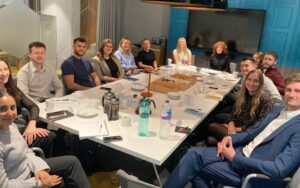Growing up amidst turbulent changes and uncertainty, along with the rise of the internet, the next generation have fostered unique expectations, needs and goals, setting them apart from their predecessors.
As young professionals prioritise purpose and flexibility, businesses must create the right working environment- physical spaces and culture – to engage, motivate and empower the leaders of the future.
With priorities including skills development, collaboration, and diversity, finding new ways to attract and retain this next generation of talent is crucial to future-proofing the workplace.
SPACE regularly engage with their clients to take the temperature of the workplace sector. Responses come from today’s leadership. What about the leaders of the future? Are their voices being heard? We hosted roundtable events in Aberdeen, Glasgow and Edinburgh recently and invited young professionals from across the public, private and third sector to share their thoughts on workplace issues that are important to them. As well as being a really enjoyable way of expanding our professional network, the attendees were eager to engage (and remain engaged in such discussions in the future) and share the good, the bad and the ugly of their working lives. Here are the key takeaways from the events:
Skills over salary
While salary continues to be important for managing the cost-of-living crisis, the next generation is seeking opportunities for growth and advancement. They want employers to invest in their professional development while building confidence early in their careers. In fact, some attendees stated that training and development initiatives had attracted them to their current employer.
Young professionals want to gain valuable knowledge and experience that can be applied throughout their careers, not just for a promotion. All attendees reported receiving some form of training and development, from office-wide training and ‘lunch and learn’ to Continual Professional Development (CPD) courses. By supplementing this formal training with the development of core skills aligned with employee goals, from time management to collaboration and leadership, businesses can holistically support the personal and professional development of the next generation.
Breaking down professionalism
As some of the attendees began their careers amidst the rise of hybrid working and virtual meetings, the next generation is challenging traditional notions of professionalism. ‘Dressing for your diary’ is the new standard: client meetings still require formal attire, but casual dress is increasingly acceptable for days in the office. Ultimately, an awareness of what is appropriate for different audiences and situations is more important than what you wear, with traits like respect and empathy continuing to be valued.
However, not every organisation is experiencing this shift towards greater flexibility. Young professionals working in a formal organisation culture or occupations such as Law and Engineering, uphold long-held notions of professionalism, while creatives have greater agency to break down these notions and express their individual personality. Does professionalism and career progression come at the expense of personality?
Working with purpose
The next generation wants to feel a sense of purpose and fulfilment in their jobs, aligned with their personal beliefs and goals. According to Deloitte’s latest Gen Z and Millennial survey, over 30% of young professionals have turned down employers that do not align with their values. In fact, a positive company culture had driven some of our attendees to their current role over competitors.
While the next generation believes that culture and purpose are vital for businesses, there is disagreement as to how this should manifest. For some, values need to be written down and even displayed, to stay front of mind. But for others, company culture must evolve along with its workforce. Leaders should work with employees to develop, rather than impose, values and regularly review their priorities based on staff feedback. As has been said before, a well-designed workplace says more about a company’s culture than values written on the boardroom wall.
Driving diversity and inclusion
Priding itself on being accepting and open, an important value for the next generation is a genuine commitment to improving diversity and inclusion, beyond a tick-box exercise. While workshops and training garner awareness and an understanding of marginalised groups, businesses must continually review how diverse and inclusive their workplaces are.
Many of our attendees boasted ways that their organisation was leading on diversity and inclusion, from recruiting neurodiverse candidates to workshops on mental health and reverse mentoring with senior colleagues. With so many opportunities to create an inclusive workplace, there is a lot that businesses can learn from other sectors and organisations.
Going green
Sustainability is no longer just a buzzword; young professionals are choosing businesses and leaders that make a significant contribution to fighting climate change.
Although there isn’t a one-size-fits-all solution, the first step for every business, regardless of size, is to gain an awareness of its environmental impact in order to reduce it. Many want to see action happening, and not just words. The value of small changes in our own workplaces, but also being able to challenge client’s briefs, some attendees even reported that their employers were turning down clients for not being sustainable enough. Meanwhile, others have set up sustainability groups within their organisations to ensure progress towards minimising their environmental impact. But interestingly for some, sustainability was not a high agenda issue.
Staying flexible
The last few years have significantly shaped expectations around workplace flexibility, and for the next generation, it is more important than salary, according to research by the London School of Economics and software company Freshworks. Across all generations, according to EY’s 2022 study – Work Reimagined – the top 3 employees are looking for are in order (1) pay, (2) flexibility in when / where they work and (3) better career advancement. In that respect, Next Gen are perhaps bucking the trend.
While hybrid working has become the norm for many sectors, some attendees recognised the value of working alongside senior colleagues in the office for early career development. Others acknowledged the downsides to remote work, including the impact on mental health. Ultimately, every young professional has different needs and expectations so offering flexible working where possible can foster a more inclusive work environment.
Making the right connections
An important but sometimes overlooked element of training, networking enables staff to build confidence as well as open the doors to new clients, peers, and opportunities. Being able to learn from colleagues in your organisation is equally as important as connecting with new people within your industry and beyond.
However, there is a disparity between the networking opportunities available to the next generation. Events are more accessible for the private sector, with young professionals in the public sector citing confidentiality issues when connecting with external peers. Meanwhile, networking is built into some job requirements, but other young professionals must independently seek out these opportunities. To guide the next generation through the early stages of their career, managers and leaders can facilitate new connections and work with employees to scope out valuable networking events to attend.
Designing the right spaces to enable people to connect is also vital. Businesses should create social / collaborative spaces within the office that can function for networking or outsource these events to hotels and conference spaces that have this goal in mind. By supporting young professionals to advance their personal and professional growth, businesses can invest in their talent nurture the leaders of the future.
What does this mean for the workplace?
The design of an office space can shape how employees work together and the culture that emerges. Amenities fallen into disuse should be reconsidered to ensure that the space adds value for staff. One attendee reported an idle pool table while another stated that employees ate lunch at their desks, making the café redundant. Too much space in this day and age is a luxury no organisation can afford, so it is important to ensure that every square metre adds value.
Meanwhile, open-plan offices enable unplanned interactions and knowledge-sharing which is crucial as young professionals begin their careers. Dynamic and varied workspaces with collaborative areas and breakout spaces also encourage employees to come into the office while sit-stand options can foster greater wellbeing.
Meeting rooms and bookable offices remain crucial for privacy and independent work as well as booths for calls to avoid disturbing other colleagues. By creating inspiring and inclusive workplaces, businesses can foster a collaborative company culture that attracts the next generation of talent and future-proofs its workforce. As well as great spaces and seamless technology, what will encourage people to come into the office is … people.
As we close our first series of discussions, we’ve learned that securing the next generation of talent is paramount for businesses to thrive. Gen Z and younger millennials have distinct needs and expectations, valuing purpose, flexibility, diversity, sustainability, and networking opportunities and businesses must invest in skills development, embrace workplace flexibility, and create inclusive environments.





